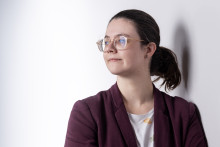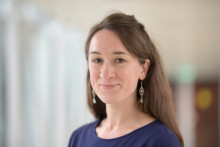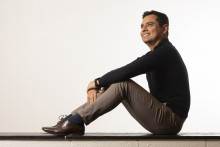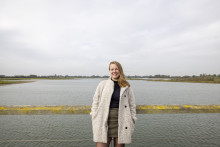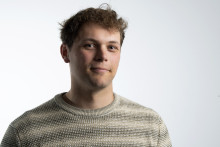‘Chemistry has always been fascinated to me, it is all around you, yet you can’t see it. This mysterious nature drew me into the field. However, studying only chemistry felt too abstract. I wanted to do more than just conduct syntheses. I want to use my knowledge in practice. That led me to a double master’s degree in Nanotechnology and Chemical Science & Engineering. People often think that you have to work twice as hard, but in reality, you study longer, not necessarily harder. This was actually great for me, it gave extra time to decide what to do with my life.
There was of course the question of: to PhD or not to PhD? It could go either way. I had a great time working in a company during my internship, but I didn’t want to rule out a PhD. My supervisor offered me a project that I could not refuse. The relationship with my supervisor and colleagues, which is good, was a big deciding factor. Otherwise it might have gone another way.’
About Esli Diepenbroek
PhD research topic: Electrically switchable hydrogels for the dewatering of water-rich biomass
Work: PhD candidate at Biomolecular Nanotechnology group, Faculty of Science and Technology at the University of Twente
Education: Double master’s degree Nanotechnology and Chemical Science & Engineering, University of Twente
Originally from: Ruurlo, The Netherlands
‘My PhD research is part of a large project ELECTRIFIED, which aims to design new electrically driven technologies for industrial drying. In industrial applications, such as when making paper or drying food, drying is done by evaporation. They currently have to evaporate the water from the product using fossil fuels, which is very inefficient and not environmentally friendly. Our goal is to use electricity to directly remove the water from the product.
As a material engineer, my task within this project is to a develop a new hydrogel material. Hydrogels are essentially spongy materials that can absorb a lot of moisture, and so my goal is to create a new material, which can be controlled by electrical impulses and absorb and release water on demand. These hydrogels can then be implemented in the drying technologies to hopefully boost their performance and durability.’
‘I was determined to work on something applicable to society’
‘When considering a PhD position, I was not looking for a specific topic, because I’m broadly oriented and enthusiastic about many different things. However, I was determined to work on something applicable to society, to know what I do my research for.

For me, it was also important to work on a bigger project, ideally in a large consortium with many different stakeholders and experience. This all came true. My research is very applied. It is very clear where the product will be used and why, which is very important. I would be sorry if my four years of research would end up somewhere in a cupboard without anyone looking at it for twenty years.’
‘The best part of doing a PhD is this freedom of exploring’
‘I’m still in the PhD honeymoon phase, my first year. So far, the project is exactly what I expected, but the challenge lies in organization – and pushing your research forward. I’m quite organized, want to be in the driver’s seat, but there are so many options on which direction to take. This was something I didn’t necessarily expected to be so difficult.
On the other hand, the best part of doing a PhD is this freedom of exploring. You have quite a lot of freedom compared to other jobs. I also very much enjoy doing educational activities, such as giving courses and supervising students. The worst part of the journey is realizing that in some respects, you are really not the expert. This can be frustrating because you feel like you have already studied a lot and you want to move forward. In the end, this isn’t bad though. Setbacks are just part of the process. People told me that doing a PhD is learning how to deal with disappointment, and so I knew this would come.
To stay in academia or not, I need to go through all the ups and downs of a PhD. At some point, a roller coaster of emotions and struggles is bound to come, but that hasn’t happened yet. I need to experience this more before I decide what to do after. Liking a PhD is not the same as liking a postdoc position. The further you go in academia, the less it becomes about research and the more time you spend on administration. Regardless, I’m still positive. Maybe in four years, I’ll feel very differently, but I’m enjoying it so far.’



